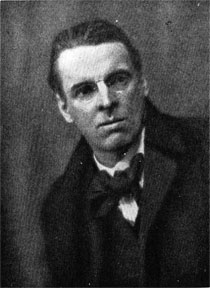EXTREME self-consciousness is the most striking peculiarity of writers nowadays. George Moore painted his own portrait in “Mike Fletcher,” and, ever on, in “Memoirs of My Dead Life” and “Hail and Farewell.” Every one of Bernard Shaw’s prefaces to his plays is a confession of some sort. Their most distinguished contemporary among the poets, W. B. Yeats, is going the same way. The first part of an autobiography, “Reveries over Childhood and Youth,” is to be the next book brought out a few weeks from now by the Cuala Press, the notable publishing house at Dundrum in the County of Dublin.
Perhaps it is because he has had such a crowded life that Yeats sees nothing incongruous in taking the world into his confidence at such a comparatively early age. He began young. His first poems were printed in the Dublin University review before he had left the high school of Erasmus Smith, and his first volume appeared at a time when most boys are entirely occupied with college examinations. As far back as 1908 his “works” were brought out by Bullen in eight lordly volumes—with the well-known Sargent sketch and other portraits and a full bibliography.
Yeats has come at times under powerful individual influences, as in the case of William Morris, John O’Leary and John E. Taylor. But he has affected others more than other affected him. This dreamer of dreams and disciple of Blake and the mystics has been a wonderful doer of things, as well as a writer of things. He founded the Irish Theatre; discovered John M. Synge and persuaded him to turn dramatist; so influenced George Moore that he turned his back on Paris and London and joined the movement; got Bernard Shaw to work on that fine play, “John Bull’s Other Island;” persuaded Lady Gregory that she could write comedies; lured Dr. Douglas Hyde away from his politics for a time, and is largely responsible for theatrical experiments in various places like those of the Ulster and the Manchester Players. Indeed the development of the small theatre in America and in Europe has been to a considerable extent a result of his efforts.
Not since the wild youth of Victor Hugo had a play caused a riot in a theatre until Yeats put on Synge’s “Playboy of the Western World,” and the struggle between prejudice and the other thing was repeated in New York.
Yeats has interested in a new form of the drama not only Irish and English work-people but the sophisticated men of Oxford, Cambridge and Harvard.
